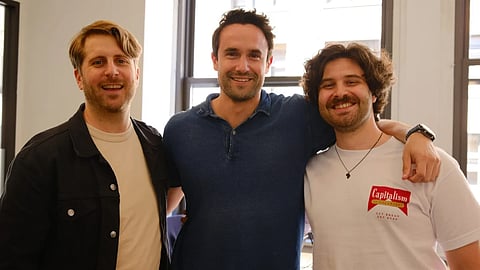Cape‑born Cerebrium nets R151mn from Google’s Gradient Fund, sparks local AI hype
Key topics:
South African AI startup Cerebrium raised $8.5mn seed round led by Google Gradient.
Cerebrium offers serverless AI infrastructure cutting costs by 40% vs cloud giants.
Customers praise Cerebrium’s fast, scalable AI tools powering real-time voice/video apps.
Sign up for your early morning brew of the BizNews Insider to keep you up to speed with the content that matters. The newsletter will land in your inbox at 5:30am weekdays. Register here.
Support South Africa’s bastion of independent journalism, offering balanced insights on investments, business, and the political economy, by joining BizNews Premium. Register here.
If you prefer WhatsApp for updates, sign up to the BizNews channel here.
The auditorium doors will open for BNIC#2 on 10 September 2025 in Hermanus. For more information and tickets, click here.
South African-founded artificial intelligence (AI) startup Cerebrium has raised $8.5 million (R151 million) in a seed funding round led by Google’s AI-focused venture fund Gradient.
Other investors in the funding round were startup accelerator Y Combinator, which has backed companies like Airbnb, Coinbase, Dropbox, and Reddit, as well as Authentic Ventures and Maxitech.
The company said the funding would enable investments in new features and meeting “surging” enterprise demand for its services.
Cerebrium was founded in Cape Town by former OneCart chief technology officer Michael Louis and senior software engineer Jonathan Irwin.
Louis previously also worked as an MTN consultant and co-founded storage, parking, and venue space app Sxuirrel.
Cerebrium’s goal is to help software engineers focus on building AI products rather than hiring an infrastructure team, racking up six-figure cloud bills, or worrying about security and compliance.
“Cerebrium is a serverless AI infrastructure platform built from the ground up to power the next generation of high-performance AI applications,” the company explains.
“From real-time voice bots to multimodal inference pipelines and large-scale batch jobs, we make it radically easier for teams to deploy, scale, and operate AI workloads — without managing a single server.”
The company identified an opportunity in the market after Louis and Irwin struggled to build their own AI products.
“Tooling was fragmented, there was an education gap between theory and production, the unit economics didn’t make sense, and development cycles took months,” Louis said.
Read more:
While the company is now headquartered in New York, its four-person team are all South African. It is currently advertising for two more positions with remote working possible in South Africa, the US, and the UK:
Machine learning/artificial intelligence developer advocate — $60,000 to $130,000 annual salary
Senior platform engineer — $140,000 to $200,000 annual salary
Below is an example of one of the products built with Cerebrium’s tools — a real-time AI commentator capable of providing instant analysis and dynamic narration for live events.
High praise from investors and customers
Gradient partner Eylul Kayin believes that the Cerebrium team has pulled off an incredible achievement for such a small team.
“They’re powering some of the most advanced AI voice and video applications at scale,” Kayin said. “We believe specialised infrastructure, which scales elastically, will be essential as real-time AI becomes core to customer experiences.”
Cerebrium is positioning itself as an alternative to Amazon Web Services Sage Maker, one of the world’s biggest managed machine learning services.
Cerebrium allows companies to deploy machine learning models to serverless GPUs with cold-start times under five seconds.
The company said its customers typically enjoyed 40% cost savings compared to using traditional cloud providers.
The platform can also scale models to more than 10,000 requests per minute with minimal engineering overhead.
Among Cerebrium’s current customers are Deepgram, Tavus, Vapi, bitHuman, LiveKit, Superdial, and South Africa-based Lelapa AI.
Tavus machine learning engineer Roey Paz-Priel said that Cerebrium consistently delivered the speed and reliability his company needed for real-time audio and video models.
“Even as we’ve scaled rapidly and gone viral, they’ve kept up with our compute demands and delivered the stability we rely on. It has become a core part of our infrastructure,” Paz-Priel said.
Lelapa AI is becoming a familiar local name. It launched Africa’s first multilingual AI large language model called InkubaLM, also called the Dung Beetle Language Model.
The latest version — InkubaLM-0.4B — has been trained for Hausa, isiXhosa, isiZulu, Swahili, and Yoruba — using 1.9 billion data tokens.
Cerebrium currently offers users a free trial of its service with a $30 credit and no payment details required. Special offers with up to $1,000 in free credits are also available on request.
This article was first published by MyBroadband and is republished with permission

